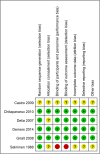Probiotics for prevention of radiation-induced diarrhea: A meta-analysis of randomized controlled trials
- PMID: 28575095
- PMCID: PMC5456391
- DOI: 10.1371/journal.pone.0178870
Probiotics for prevention of radiation-induced diarrhea: A meta-analysis of randomized controlled trials
Abstract
Background: Radiotherapy is commonly used for abdominal or pelvic cancer, and patients receiving radiotherapy have a high risk developing to an acute radiation-induced diarrhea. Several previous studies have discussed the effect of probiotics on prevention of radiation-induced diarrhea, but the results are still inconsistent.
Objective: We performed a meta-analysis of randomized controlled trials (RCTs) to evaluate the efficacy of probiotic supplementation for prevention the radiation-induced diarrhea.
Methods: Relevant RCTs studies assessing the effect of probiotic supplementation on clinical outcomes compared with placebo were searched in PubMed, EMBASE, and the Cochrane Library databases (up to March 30 2016). Heterogeneity was assessed with I2 and H2, and publication bias was evaluated using sensitive analysis.
Results: Six trials, a total of 917 participants (490 participants received prophylactic probiotics and 427 participants received placebo), were included in this meta-analysis. Compared with placebo, probiotics were associated with a lower incidence of radiation-induced diarrhea (RR: 0.55; 95% CI: 0.34-0.88; P = 0.01; I2: 87%; 95% CI: 75%-94%; H2: 2.8; 95% CI: 2.0-4.0). However, there is no significant difference in the anti-diarrheal medication use (RR: 0.68; 95% CI: 0.40-1.14; P = 0.14) or bristol scale on stool form (RR: 0.64; 95% CI: 0.35-1.17; P = 0.14).
Conclusion: Probiotics may be beneficial to prevent radiation-induced diarrhea in patients who suffered from abdominal or pelvic cancers during radiotherapy period.
Conflict of interest statement
Figures






References
-
- Stewart BW, Wild CP. World Cancer Report 2014. International Agency for Research on Cancer. World Health Organization. 2014;505. Available from: https://shop.iarc.fr/products/wcr2014 (accessed 14 Janauary 2017).
-
- Eddins C, Gray M. Are probiotic or synbiotic preparations effective for the management of clostridium difficile-associated or radiation-induced diarrhea? J Wound Ostomy Continence Nurs. 2008;35: 50–58. doi: 10.1097/01.WON.0000308619.01756.16 - DOI - PubMed
-
- Giralt J, Regadera JP, Verges R, Romero J, de la Fuente I, Biete A, et al. Effects of probiotic Lactobacillus casei DN-114 001 in prevention of radiation-induced diarrhea: results from multicenter, randomized, placebo-controlled nutritional trial. Int J Radiat Oncol Biol Phys. 2008;71: 1213–1219. doi: 10.1016/j.ijrobp.2007.11.009 - DOI - PubMed
-
- Blanarova C, Galovicova A, Petrasova D. Use of probiotics for prevention of radiation-induced diarrhea. Bratisl Lek Listy. 2009;110: 98–104. - PubMed
-
- Gami B, Harrington K, Blake P, Dearnaley D, Tait D, Davies J, et al. How patients manage gastrointestinal symptoms after pelvic radiotherapy. Aliment Pharmacol Ther. 2003;18: 987–994. - PubMed
Publication types
MeSH terms
Substances
LinkOut - more resources
Full Text Sources
Other Literature Sources
Medical

